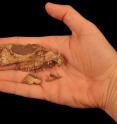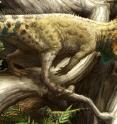Oldest horned dinosaur species in North America found in Montana
Related images
(click to enlarge)
Scientists have named the first definite horned dinosaur species from the Early Cretaceous in North America, according to a study published December 10, 2014 in the open-access journal PLOS ONE by Andrew Farke from Raymond M. Alf Museum of Paleontology and colleagues. The limited fossil record for neoceratopsian--or horned dinosaurs--from the Early Cretaceous in North America restricts scientists' ability to reconstruct the early evolution of this group. The authors of this study have discovered a dinosaur skull in Montana that represents the first horned dinosaur from the North American Early Cretaceous that they can identify to the species level. The authors named the dinosaur Aquilops americanus, which exhibits definitive neoceratopsian features and is closely related to similar species in Asia. The skull is comparatively small, measuring 84 mm long, and is distinguished by several features, including a strongly hooked rostral bone, or beak-like structure, and an elongated and sharply pointed cavity over the cheek region. When alive, the authors estimate it was about the size of a crow.
This discovery, combined with neoceratopsian fossil records from elsewhere, allows the authors to support a late Early Cretaceous (~113-105 million years ago) intercontinental migratory event between Asia and North America, as well as support for a complex set of migratory events for organisms between North America and Asia later in the Cretaceous. However, to better reconstruct the timing and mode of these events, additional fieldwork will be necessary.
"Aquilops lived nearly 20 million years before the next oldest horned dinosaur named from North America," said Andrew Farke. "Even so, we were surprised that it was more closely related to Asian animals than those from North America."
Source: PLOS
Other sources
- Newly discovered dinosaur Nasutoceratops had cow-like hornsfrom The Guardian - ScienceThu, 11 Dec 2014, 2:00:14 UTC
- Oldest horned dinosaur species in North America discoveredfrom UPIWed, 10 Dec 2014, 22:00:55 UTC
- Skull of oldest horned dinosaur in North America foundfrom The Guardian - ScienceWed, 10 Dec 2014, 22:00:23 UTC
- Oldest horned dinosaur species in North America found in Montana: Hooked beak, sharply pointed cheeks distinguishes neoceratopsian speciesfrom Science DailyWed, 10 Dec 2014, 21:30:59 UTC
- Horned Dinosaur Was About the Size of a Crowfrom MSNBC: ScienceWed, 10 Dec 2014, 21:30:19 UTC
- Meek Montana plant-eater foreshadowed huge horned dinosaursfrom Reuters:ScienceWed, 10 Dec 2014, 20:50:04 UTC
- Oldest horned dinosaur in North Americafrom CBSNews - ScienceWed, 10 Dec 2014, 20:30:37 UTC
- Photos: Oldest Known Horned Dinosaur in North Americafrom Live ScienceWed, 10 Dec 2014, 19:30:29 UTC
- Oldest Horned Dinosaur in North America Was the Size of a Crowfrom Live ScienceWed, 10 Dec 2014, 19:30:28 UTC
- Oldest horned dinosaur species in North America found in Montanafrom PhysorgWed, 10 Dec 2014, 19:00:34 UTC

